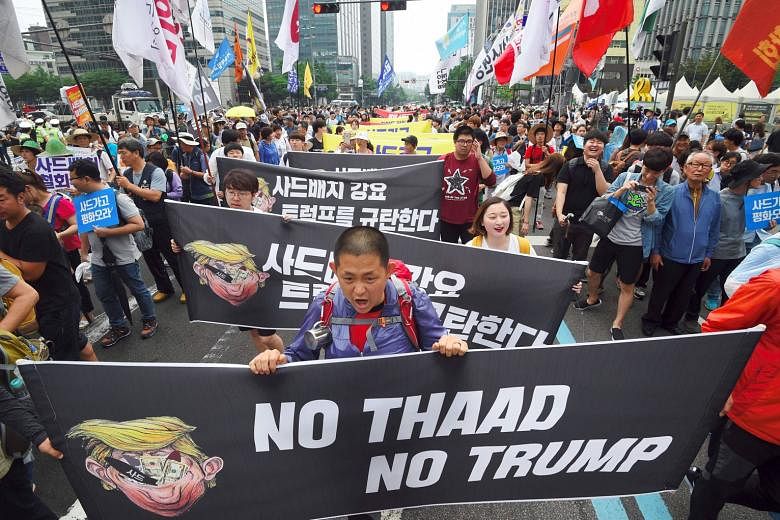In the joint statement released after the first summit between US President Donald Trump and South Korean leader Moon Jae In, there were visible efforts to iron out differences between the two sides and put positive spins on them.
What is most noteworthy from last week's summit is the glaring omission of Thaad, or Terminal High Altitude Area Defence anti-missile system, from their statement.
Seoul and Washington, in order to present their leaders' first meeting in the best light, decided to sweep their differences over Thaad under the rug. The issue is so controversial and delicate that the two sides agreed to keep it out of the summit agenda (at least officially), apparently fearing the grave consequences that could arise from any public display of differences.
Since the first batch of the anti-missile system was deployed - under the cover of darkness - in late April, less than two weeks before the South Korean presidential election, Thaad has become the lynchpin of the United States counter-measure against the threat of North Korean missiles.
All of a sudden, Thaad has become representative of the backbone of the US-Korea military alliance, but it has also presented the Moon administration with its thorniest foreign policy issue.
While a slight majority of people in South Korea view the anti-missile system as a necessary measure to counter escalating North Korean military adventurism, Thaad's deployment on Korean soil has also resulted in Seoul being wedged between its security guarantor the US and next-door giant China.
Beijing opposes Thaad because of its radar's potent detection capability, possibly well into Chinese territory.
South Korea is now struggling with a trilemma over Thaad, having to send all three messages at the same time:
- It has to tell domestic constituents that "a lot has changed" since the previous conservative administration;
- It has to tell American counterparts "nothing has changed";
- It has to tell China "something has changed".
By doing so, it will inevitably sow more confusion in its foreign policy direction. In the message to the domestic audience, the government must convince its people that "a lot has changed" within the past year.
South Korea's new administration feels it has the political obligation to fulfil its campaign promises that it will take correctional measures with respect to Thaad. Apparently, the new administration is unable to accept as a fait accompli the deployment decision made by the previous administration.

Mr Moon and his party, formerly the main opposition, had earlier vehemently opposed the decision in July last year to deploy Thaad. Mr Moon has since moderated his position on Thaad.
The "a lot has changed" message to South Koreans and the ruling party's core support groups will serve to justify Thaad without the Moon government being seen as backtracking on its position.
In the message to Washington, Seoul must vow that "nothing has changed and nothing will".
It has to accommodate the US demand: Washington has made clear that the deployment of the anti-missile system is the only option in its game plan.
Indicating changes in the face of this specific demand will lead to a diplomatic disaster that may test the bilateral military alliance - a consequence which South Korea can ill afford.
When the US referred to the deployment as a measure to protect the lives of its soldiers in South Korea, it clearly showed it would tolerate no changes to the Thaad deal as agreed upon by the previous administration. So, towards Washington, Seoul must continue to send out the "no change" signal.
In its message to China, South Korea has to show that it has done something to accommodate Beijing's demand.
In retaliation for the Thaad deployment, China has imposed various bilateral sanctions against South Korea for several months.
Chinese retaliation is real and intrusive: Statistics put South Korea's economic loss during this period at US$15 billion (S$20.7 billion).
China also makes clear that the sanctions will continue unless South Korea scraps its original plan and reverses deployment and returns the batteries to the US.
Signalling that "something has changed" in its exchanges with Beijing is critical to keep the Chinese retaliation at bay, at least for the time being.
Now, caught in the bind of this trilemma, South Korea's only viable option is to slow down the deployment process without scrapping the plan entirely.
A recent decision to check if all statutory procedures have been satisfactorily completed, including an environmental assessment, will delay the process.
South Koreans, the US and China can then interpret the delay in ways that suit their respective agendas. But the problem with this option is that it will not solve the trilemma. It simply kicks the can down the road.
Given the heightened tensions on the Korean peninsula, South Korea will face constant calls from all sides for a clear position on Thaad. As the three competing demands cannot be met at the same time, one (or two) will have to be ultimately chosen over the other.
The price to be paid for the lack of clarity on the issue of Thaad will increase proportionally to the amount of time thus bought.
The ultimate decision to omit the topic from the official US-South Korea summit agenda only underscores South Korea's Thaad predicament. As long as Seoul purports to satisfy all three parties at the same time, it will have to present ambiguous words and positions that keep shifting along the spectrum of "changes" as discussed in this piece. It will be a situation that satisfies no one.
While Seoul is agonising over its choices in the trilemma, Pyongyang yesterday ratcheted up its missile threat a few notches by claiming that it had succeeded test- firing an intercontinental ballistic missile. If the claim is confirmed, the vice of the trilemma will further tighten around South Korea.
South Korea must have more clarity, not less, on its final stance on Thaad.
- The writer is professor of law at the School of Law of Seoul National University.

